BlasMolero
Mechanical
Hello!,
I have just posted in the FEMAP blog a few examples of mechanisms solved with SOL402 Nonlinear Kinematic in FEMAP, showing how to perform simultaneously multibody dynamic analysis (MBDA) and nonlinear analysis with large displacements and nonlinear material by implicit integration on time domain using the SOL402 Nonlinear Kinematic module, all integrated in FEMAP V2020.2.
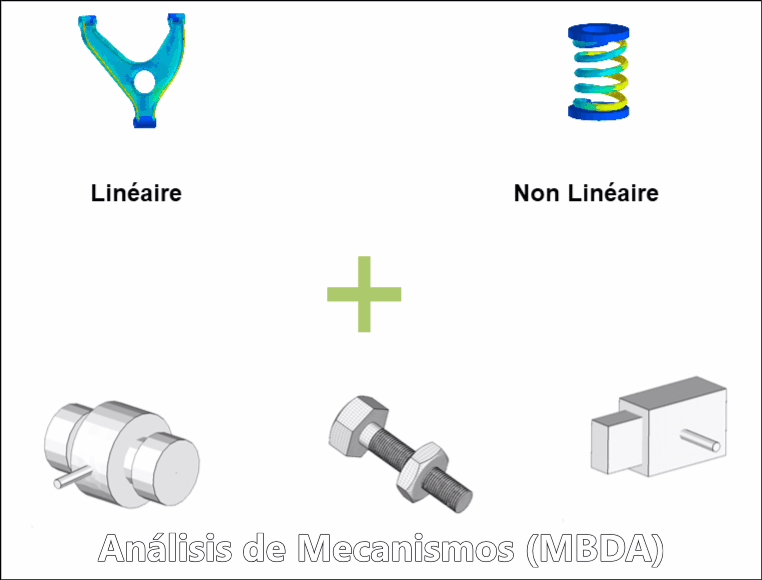
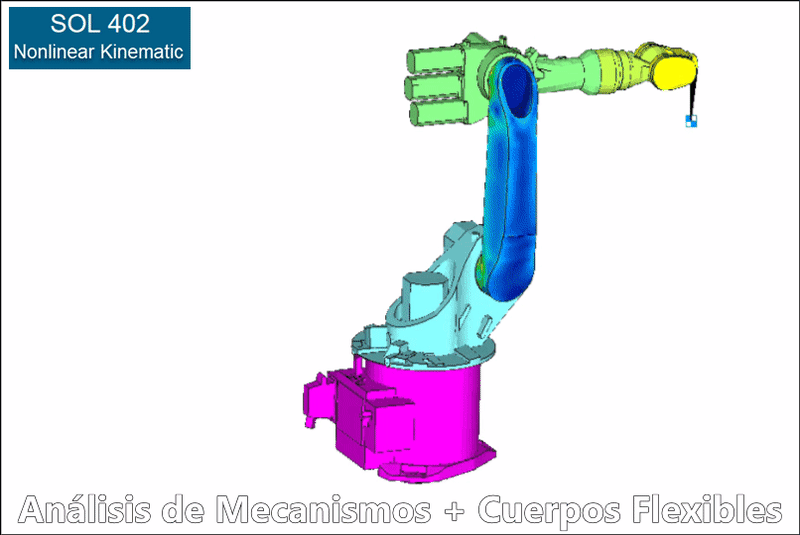
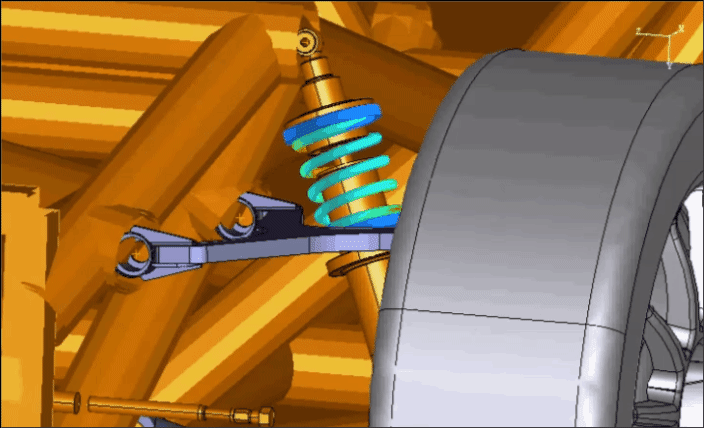
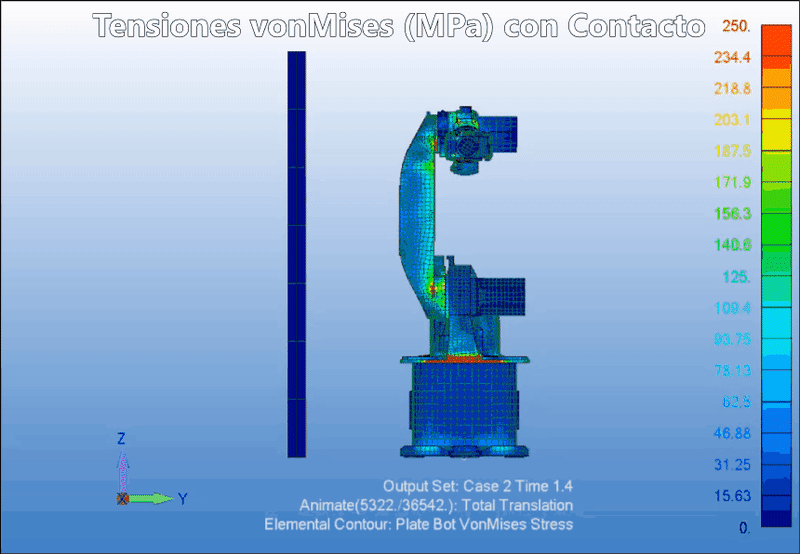
Also I have included in the POST a general vision of the powerful capabilities of Simcenter Nastran MultiStep Nonlinear (SOL401/402) module, native from SIEMENS, integrating different nonlinear technologies that make it really powerful. Siemens has brought together the Nastran technology that has been a standard for more than 50 years and combined it with the advanced nonlinear capabilities in SAMCEF MECANO to create a new Nastran Multistep nonlinear solver that results in the Simcenter Nastran Multistep Nonlinear solution that consists of the SOL401 and SOL402. These solution technologies rely on a common set of formulations for elements, materials, and algorithms to give fast, accurate, and comprehensive solutions.
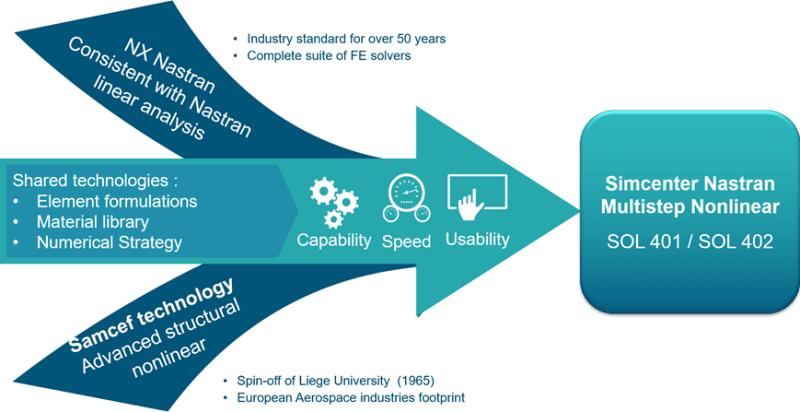
By offering two nonlinear solutions in Nastran SIEMENS is able to quickly bring advanced nonlinear capabilities that are available in the SAMCEF MECANO solver into Simcenter Nastran. It is important to understand that these two solutions use the same license. Therefore, customers do not have to choose which one to purchase. Instead, they only have to decide which one to use for their particular application.
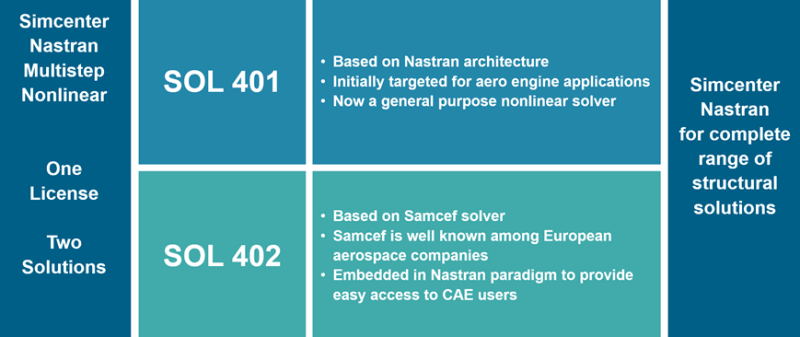
Both SOL401 and SOL402 are set up as multistep solutions meaning that they support multiple subcases and perform different solutions – such as static, dynamic, modal, buckling, Fourier, Complex modes … in the separate subcases. Since their element and solution algorithms are very similar, the two solvers have a great deal of commonality and thus for many solutions either solver is applicable. There are, however, a few use cases where one solver may have capabilities the other does not. Over time it is expected that some of those differences will disappear and there will be almost complete commonality. But for now the major functional differences between SOL401 and SOL402 is that SOL401 supports multiphysics co-simulation with other Simcenter solvers such as Simcenter Thermal and Simcenter STAR-CCM+ for FSI solutions. On the SOL402 side, it can uniquely support nonlinear mechanism type deformations and includes joint elements and driver loads.
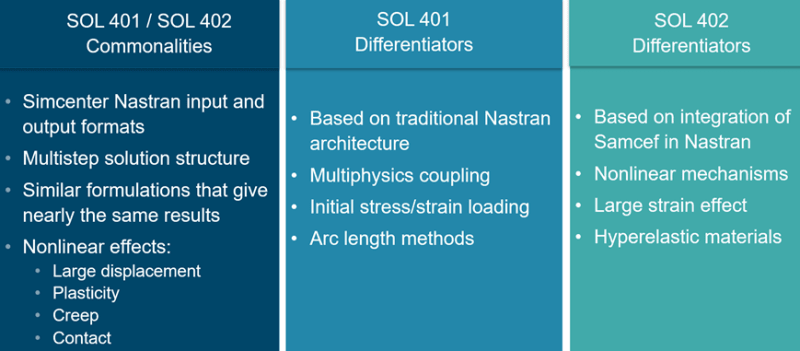
Best regards,
Blas.
~~~~~~~~~~~~~~~~~~~~~~
Blas Molero Hidalgo
Ingeniero Industrial
Director
IBERISA
48004 BILBAO (SPAIN)
WEB: Blog de FEMAP & NX Nastran:
I have just posted in the FEMAP blog a few examples of mechanisms solved with SOL402 Nonlinear Kinematic in FEMAP, showing how to perform simultaneously multibody dynamic analysis (MBDA) and nonlinear analysis with large displacements and nonlinear material by implicit integration on time domain using the SOL402 Nonlinear Kinematic module, all integrated in FEMAP V2020.2.




Also I have included in the POST a general vision of the powerful capabilities of Simcenter Nastran MultiStep Nonlinear (SOL401/402) module, native from SIEMENS, integrating different nonlinear technologies that make it really powerful. Siemens has brought together the Nastran technology that has been a standard for more than 50 years and combined it with the advanced nonlinear capabilities in SAMCEF MECANO to create a new Nastran Multistep nonlinear solver that results in the Simcenter Nastran Multistep Nonlinear solution that consists of the SOL401 and SOL402. These solution technologies rely on a common set of formulations for elements, materials, and algorithms to give fast, accurate, and comprehensive solutions.

By offering two nonlinear solutions in Nastran SIEMENS is able to quickly bring advanced nonlinear capabilities that are available in the SAMCEF MECANO solver into Simcenter Nastran. It is important to understand that these two solutions use the same license. Therefore, customers do not have to choose which one to purchase. Instead, they only have to decide which one to use for their particular application.

Both SOL401 and SOL402 are set up as multistep solutions meaning that they support multiple subcases and perform different solutions – such as static, dynamic, modal, buckling, Fourier, Complex modes … in the separate subcases. Since their element and solution algorithms are very similar, the two solvers have a great deal of commonality and thus for many solutions either solver is applicable. There are, however, a few use cases where one solver may have capabilities the other does not. Over time it is expected that some of those differences will disappear and there will be almost complete commonality. But for now the major functional differences between SOL401 and SOL402 is that SOL401 supports multiphysics co-simulation with other Simcenter solvers such as Simcenter Thermal and Simcenter STAR-CCM+ for FSI solutions. On the SOL402 side, it can uniquely support nonlinear mechanism type deformations and includes joint elements and driver loads.

Best regards,
Blas.
~~~~~~~~~~~~~~~~~~~~~~
Blas Molero Hidalgo
Ingeniero Industrial
Director
IBERISA
48004 BILBAO (SPAIN)
WEB: Blog de FEMAP & NX Nastran:
